 I shouldn’t have read the book before watching the movie! Although I know that William Wellman’s searing The Ox-Bow Incident is a classic (and impressed me deeply the first time I saw it), this time around I was slightly underwhelmed. It still devastates, but felt like an opportunity missed.
I shouldn’t have read the book before watching the movie! Although I know that William Wellman’s searing The Ox-Bow Incident is a classic (and impressed me deeply the first time I saw it), this time around I was slightly underwhelmed. It still devastates, but felt like an opportunity missed.
The Ox-Bow Incident is the story of a lynching. It is set in the 1880s in Nevada and occurs over 24 hours. The book, published in 1940, was written by Walter Van Tilburg Clark and was adapted as a film in 1943. Director William Wellman had to fight to make The Ox-Bow Incident. Studio heads thought it wouldn’t make money. They were proved right, but the film has nevertheless become one of the great classics of movie westerns.
The film is a remarkably accurate adaption of the book, even employing much of the dialogue. One difference is the pacing. William Wellman is one of the most economical directors I’ve seen and The Ox-Bow Incident comes in at a mere 75 minutes. He gives a wonderful sense of the speed at which men can hear (mistakenly, as it turns out) of a death, how quickly a lynch mob is set in motion (without checking up on facts) and how that quick decision will carry them along whether they have doubts or not.
The novel actually builds more slowly. Clark is interested in exploring the facets of how a lynch mob is formed and the various motivations of people. The book is nearly half over before they even set out in search of the murderers. In the novel, the crime isn’t haste, so much as passivity. Men are angry, and furious speeches are made to rile them up, but most men don’t really want to kill anyone. There is a lot of milling around in town while storekeeper Davies tries to talk them out of going. But men are afraid of appearing weak, unmanly, not part of the group. And Clark is interested in the phenomenon where, once people set out to do something, they continue doing it simply because they don’t want to look foolish by stopping.
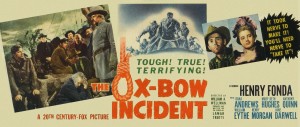 Another change is in the lead characters. The novel is narrated by Art Croft (played by Harry Morgan in the movie), who isn’t a particularly heroic man. He’s good at observing people and understanding people – the kind of guy people talk to – but ultimately he has no more moral conviction than anyone else and simply sits by while three men are lynched. His friend, Gil Carter (played by Henry Fonda) is described as a bull of a man, not someone who thinks a lot, but enjoys a fight. He, too, sits passively during the lynching, though he doesn’t quite like it.
Another change is in the lead characters. The novel is narrated by Art Croft (played by Harry Morgan in the movie), who isn’t a particularly heroic man. He’s good at observing people and understanding people – the kind of guy people talk to – but ultimately he has no more moral conviction than anyone else and simply sits by while three men are lynched. His friend, Gil Carter (played by Henry Fonda) is described as a bull of a man, not someone who thinks a lot, but enjoys a fight. He, too, sits passively during the lynching, though he doesn’t quite like it.
In the film, a lot of Art’s characteristics, dialogue and even actions are given to Gil (because he’s Henry Fonda). And because he’s Henry Fonda, he’s a lot more heroic. In the movie, Henry Fonda tries to pull a gun to stop the lynching and everyone gets in a tussle. I guess they just couldn’t bear to have Henry Fonda be a complete moral coward? Though I suppose if he wasn’t heroic there would be little for him to do. Even as the movie is, Henry Fonda still plays a less heroic role than usual. Initially, he and Art go along with the lynch mob because they are afraid of being seen as outsiders who don’t stand with the group. But still, I can’t help but think it was a slight missed opportunity. It really would have been something to see Henry Fonda stand by passively, even if his conscience was bothered.
 I was really impressed with Dana Andrews as Donald Martin, one of the men wrongly accused of murder and cattle rustling: his alternating fear, despair, the sense of unreality, the futility of talking to men who have already decided he’s guilty. He tries to take it like a man, but is scared, grieving and concerned about his wife and children. His very human reaction embarrasses people (in the novel, men are repeatedly embarrassed by the frank revelation of emotion). It’s a wonderful performance that really communicates what it must feel like to be powerless in the face of a group of people determined to kill you.
I was really impressed with Dana Andrews as Donald Martin, one of the men wrongly accused of murder and cattle rustling: his alternating fear, despair, the sense of unreality, the futility of talking to men who have already decided he’s guilty. He tries to take it like a man, but is scared, grieving and concerned about his wife and children. His very human reaction embarrasses people (in the novel, men are repeatedly embarrassed by the frank revelation of emotion). It’s a wonderful performance that really communicates what it must feel like to be powerless in the face of a group of people determined to kill you.
One change that puzzled me related to Major Tetley, who wants the lynching to happen because of his son, Gerald. Gerald and Major Tetley loath and despise each other. Gerald is sensitive and feels like a coward, but Tetley wants him to participate in the lynching and believes it will make a man of him. In the book, Tetley is a soldier who fought on the Confederate side. In the movie, he is an impostor in uniform. I can’t think why they changed that, unless it was because they didn’t want to show a former soldier in a negative light during WWII.
Inevitably, the issue of blame is softened in the movie. When the sheriff asks Davies who was responsible for the lynching, in the movie Davies says, “all but seven.” These are the seven who vote against the hanging (there are only five in the book). But in the book, no one gets away from blame quite so easily. The people who you would think have the least to blame themselves for take it the worst. Davies is in torment by the end of the novel, convinced that he could have done more. He admits to Art that at the moment of the hanging he was glad he didn’t have a gun, because it meant he didn’t have the option of pulling a gun on Tetley to try and stop him.
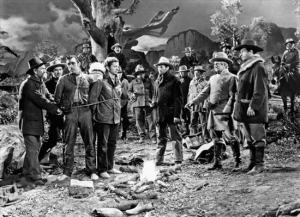 In the book (as is mostly true in the movie), there are no heroes, no would-be heroes. But the situation doesn’t call for heroes, someone to come in with guns blazing to save the day at the last moment. It calls for the majority of men involved to check themselves, stop what they were doing and be willing to look weak or silly to do the right thing. It requires the majority of the people to even know what the right thing is.
In the book (as is mostly true in the movie), there are no heroes, no would-be heroes. But the situation doesn’t call for heroes, someone to come in with guns blazing to save the day at the last moment. It calls for the majority of men involved to check themselves, stop what they were doing and be willing to look weak or silly to do the right thing. It requires the majority of the people to even know what the right thing is.
But despite being somewhat underwhelmed, it remains a superb movie. I just shouldn’t watch it the day after finishing the book – it’s distracting! But Wellman directs a spare film and keeps the focus inexorably on the story. He doesn’t go overboard making Fonda a hero, he doesn’t add any unnecessary romance, conversation, scenery. The entire film is focused on one thing alone: the lynching. It’s a film impossible to ignore or to forget.
This post is part of the “Beyond the Cover Blogathon,” hosted by Now Voyaging and Speakeasy, who I would like to thank for hosting this wonderful event! For the rest of the contributions, click here for Day 1 and Day 2.
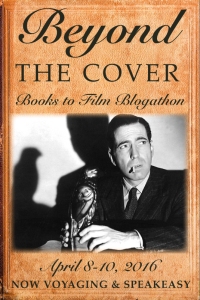
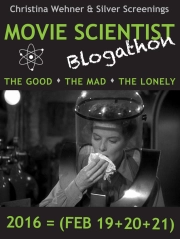
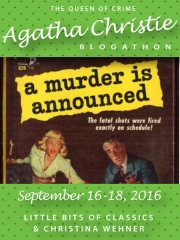


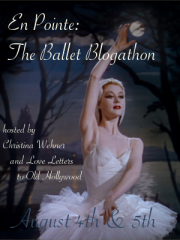

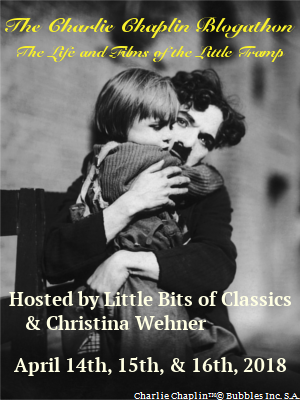
Patricia Nolan-Hall (@CaftanWoman)
April 11, 2016 at 10:01 am
Wellman and Fonda both expressed pride in this film which is certainly not misplaced. I imagine this is one novel that many felt unfilmable. Zanuck was against it at the beginning, and Wellman would gripe about how the executive would later take credit when critics acclaimed the result. I think there’s enough good will to go around.
LikeLiked by 1 person
christinawehner
April 11, 2016 at 10:33 am
They deserve to be proud! I think my reaction was mostly because I had just read the book and it’s difficult for me to shake my memory of a book when I watch the movie so closely afterwards. I think you’re right – considering how hard Wellman had to work to even make the film, it’s impressive how close it is and is perhaps ungrateful to complain that it wasn’t even closer.
LikeLike
Silver Screenings
April 11, 2016 at 10:13 am
OK, you’ve sold me on this book, and I can’t wait to read it.
Also, good analysis of the film. You always give me something to think about.
LikeLiked by 1 person
christinawehner
April 11, 2016 at 11:11 am
Thanks! Can’t wait to know what you think of it! It has some definitely stereotypical portrayals of black Americans and Mexicans, but I don’t think it reflects the authors opinions so much as the standard attitudes of 1880s cowboys.
LikeLiked by 1 person
Judy
April 11, 2016 at 1:42 pm
As a Wellman fan, I think this is one of his greatest, with powerful performances from Fonda and Andrews. Very interesting to read your comparisons with the book and your thoughts on the changes made. I’ve wanted to read the book for a long while but it’s not easily available in the UK – however I will aim to read it soon.
LikeLiked by 1 person
christinawehner
April 11, 2016 at 3:18 pm
That’s hard when a book is not easily available! Do you have the option of inter-library loans? I get a lot of my books that way. I request a book at my library and they always manage to find it for me somehow; sometimes borrowing it from another library across the country.
I agree; definitely one of William Wellman’s finest films! I used to think I didn’t like westerns, but when I started watching his (Westward the Woman, Yellow Sky) he made me change my mind. 🙂
LikeLike
Eric Binford
April 11, 2016 at 2:19 pm
I really enjoy your book vs film essays! They are so much fun, and very informative!
I know what you are saying. I watched Maltese Falcon the same night I finished the book and I found myself nitpicking the movie. The book was way too fresh in my mind to be fair to the film. Anyhow, I love The Ox-Bow Incident. It’s really a powerful little film.
LikeLiked by 1 person
christinawehner
April 11, 2016 at 3:22 pm
Thank you so much! Yeah, it does seem like it’s best to put a little distance between reading a book and viewing a movie. It’s just so hard not to nitpick, as you say. Maybe that’s what matters more than which order one watches and reads a book and movie.
I agree; it is such a powerful film! The first time I saw it, I was stunned. I’m not sure I believed they were really going to hang them until they did.
LikeLike
Le
April 12, 2016 at 12:16 pm
The Ox-Bow Incident is a great movie, and Wellmann is indeed a very economical. I hadn`t thought about how it affects the theme of this movie, though. I really enjoyed your very complete comparison between movie and book.
Thanks for the kid comment!
Kisses!
Le
LikeLiked by 1 person
christinawehner
April 12, 2016 at 12:57 pm
Thanks! Wellman’s economical direction is amazing, isn’t it? It seems like so many movies are too long, it’s incredible how well he can tell a story in such a brief time. It seems like a rare skill.
LikeLike
Grand Old Movies
April 14, 2016 at 4:07 pm
Excellent post on this film. I had the same reaction as you, having first seen the movie and then reading the novel sometime afterward, that the book raised the issues more complexly and ambivalently (as I recall, in the novel there’s no clear-cut resolution that any arrests will be made, either). I thought that the novel might have been intended as a comment on WW2, of good men who stand passively around while a few determined maniacs carry on lawlessly. The real burden of conscience in the novel was on the storekeeper character (nor did the novel have the letter-reading scene as in the film, which I thought ended things a little too patly). But the film is still a remarkable movie, well written and acted, and adult in its perspective. I wish there could be more like it.
LikeLiked by 1 person
christinawehner
April 14, 2016 at 8:11 pm
That’s a good point; The Ox-Bow Incident does stand out as a unique film. It seems to subvert all our usual expectations of the western (or even of films in general).
I so agree about the letter. It seemed unlike anything a man would really write to his wife before dying (unless he was looking out for posterity). I couldn’t help but wonder what the wife would make of such a letter!
But it seems like watching the movie sharpens the focus on the differences in the book, especially because the movie is faithful in so many other ways. It’s wonderful to have both!
LikeLike
nowvoyaging
April 19, 2016 at 5:48 pm
This is the second time I have read about this film and each time I want to see it even more! Thank you so much for the wonderful entry and for joining us!
LikeLike
christinawehner
April 19, 2016 at 7:32 pm
And thank you for hosting! It was so much fun to participate and read everyone’s entries.
LikeLiked by 1 person